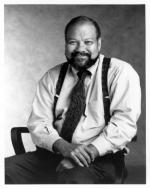Disable ads!
Henry Hampton
Henry Hampton (19 August 1940 – 22 November 1998) was an American filmmaker. He was the son of surgeon Henry Hampton Sr. and Julia Veva Hampton. A native of St. Louis, Missouri, Hampton would later move to Boston where he founded his film production company Blackside, Inc., in 1968. It became one of the largest minority-owned non-theatrical film production companies in the U.S. during the mid-1970s and until his death in the late 1990s. Hampton and his company produced over 80 programs including documentaries, television spots, and other media productions. In 1965, while working for the Unitarian church as information director, Hampton went to Selma, Alabama, to cover the death of Reverend James Reeb and participated in the Selma March. The event changed his life as he recognized the power of media and television and began to conceptualize a film documenting the Civil Rights Movement. Three years later, in 1968, he founded Blackside, Inc., which offered "special expertise in the design and production of film and audio-visual products aimed at minority audiences." Blackside's primary business between 1968 and 1979 was the production of films, television and radio spots, television programming, and audio-visual educational packages. Blackside also produced public service announcements and film-based training materials for government and commercial clients. Hampton made a commitment to social justice with later productions, including Eyes on the Prize: America's Civil Rights Years (1954-1965); and Eyes on the Prize II: America at the Racial Crossroads 1965-mid 1980s; The Great Depression (1993); Malcolm X: Make It Plain (1994); America's War on Poverty (1995); Breakthrough: The Changing Face of Science in America (1997); I'll Make Me a World: A Century of African-American Arts (1999); Hopes on the Horizon: Africa in the 1990s (2001); This Far By Faith: African American Spiritual Journeys (2003). Hampton's film archive is held by the Washington University Film & Media Archive in St. Louis, Missouri. In addition to Hampton's films, the collection contains all of the elements that went into the production process such as interviews, stock footage, photographs, research, producer notes, scripts, and Hampton's personal papers.
 Read more on wikipedia.org Read more on wikipedia.org
 All quotes by Henry Hampton All quotes by Henry Hampton
 Edit Edit
|

|
|
|
|
|
Background photo by Giuliana
|